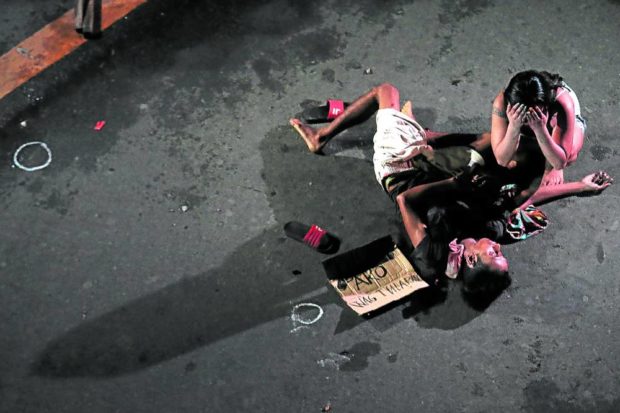
EJK VICTIM | Jennelyn Olaires weeps beside her partner, alleged drug pusher Michael Siaron, 30, a pedicab driver who was shot and killed by unidentified suspects in July 2016. (INQUIRER file photo)
MANILA, Philippines — Human rights lawyer Chel Diokno has reminded lawmakers discussing the alleged extrajudicial killings (EJKs) that the persons killed from July 2016 to November 2017 were sentenced to death by armed men and not by the courts.
He was referring to people who were killed during the anti-drug war of former President Rodrigo Duterte.
Diokno gave the statement during the House Committee on Human Rights hearing on Monday.
He said the lack of accountability in the 20,322 drug war-related deaths from July 1, 2016 to November 27, 2017 is a concern for the Free Legal Assistance Group (FLAG).
Diokno, who chairs the FLAG, noted that the number of drug war deaths can actually fill an arena in Pasay City.
“Now, I would like to emphasize, Sir, your honor, all of these people who were killed, that would fill up the SM Mall of Asia Arena and that is only for the period of 2016 July up to 2017 November,” Diokno told lawmakers.
“They were not sentenced by a court. They were sentenced by armed men,” he pointed out.
“And up to now, as we know from the testimony of the (Justice) Secretary, there have only been 52 cases that they have investigated out of 20,322 deaths. And that is why we are concerned,” he said.
It was Diokno who revealed during the hearing that the number of deaths during this period was contained in the 2017 year-end accomplishment report of the Office of the President under Duterte.
The report was cited in a Supreme Court (SC) en banc resolution released in April 2018.
Diokno said the SC noted that the fatalities during the two-year period includes 3,967 killings during police operations while 16,355 of the deaths were done by riding-in-tandem assailants and other still-unknown individuals.
He calculated that these instances translated to 39 deaths per day.
“This is a total of 20,322 deaths during the Duterte administration’s anti-drug war, from July 1, 2016 to November 27, 2017, or an average of 39.46 deaths everyday,” Diokno counted.
“This court wants to know why so many deaths happened as expressly reported under the section ‘fighting illegal drugs’ 2017 year-end report,” Diokno quoted the SC resolution.
READ: Diokno: Duterte’s OP listed 20,322 drug-war deaths as accomplishments
When the committee chair, Manila 6th District Rep. Bienvenido Abante Jr., asked if former President Duterte should also be held accountable, Diokno answered in the affirmative.
“Atty. Diokno, therefore, do you believe as a lawyer, that the former president should be held accountable?” Abante asked.
“Based on this own report, yes, your Honor. It’s very clear that if only 52 cases have been investigated by the department, (then yes),” Diokno responded.
READ: Caloocan cop found guilty for ‘drug war’ deaths of two teens
The administration of Duterte maintained that there were only around 6,250 drug war deaths in legitimate police operations.
However, some human rights groups believe the true number may be somewhere between 12,000 to 30,000 fatalities, including the people killed in operations where police officers were not involved.
Diokno said that there were already incidents where, initially, assailants were labeled, not identified, only to be later on clarified that the suspects were police officers.
“As far as I know, of the 16,355 killed by riding-in-tandem and other similar killers, two men were caught, arrested, and charged. But when they were arrested, it was discovered that they are also police officers,” Diokno said.
“This refers, your Honor, to the killing of a crime watch person in Mindoro, if I remember right, around 2016 or 2017,” Diokno recalled.
“It so happened that when the victim was shot by two individuals riding-in-tandem, they were pursued by the police, and were arrested. Eventually, it was revealed that they are also police officers,” he said.
READ: 3 policemen guilty of killing Kian delos Santos — court
The committee started its probe of Duterte’s drug war, particularly alleged EJKs in the conduct of the police operations, last May 21.
The drug war, under Oplan Tokhang, was a campaign of the first Philippine National Police (PNP) chief under Duterte’s term, Senator Ronald dela Rosa.
READ: House panel ready to probe into anti-drug war, extra-judicial killings
Tokhang was a word coined from a combination of Visayan words ‘toktok’ or to knock, and ‘hangyo’ or to plead — describing the police officers knocking on alleged illegal drug users and pushers’ doors to ask them to stop their involvement in the illegal trade.